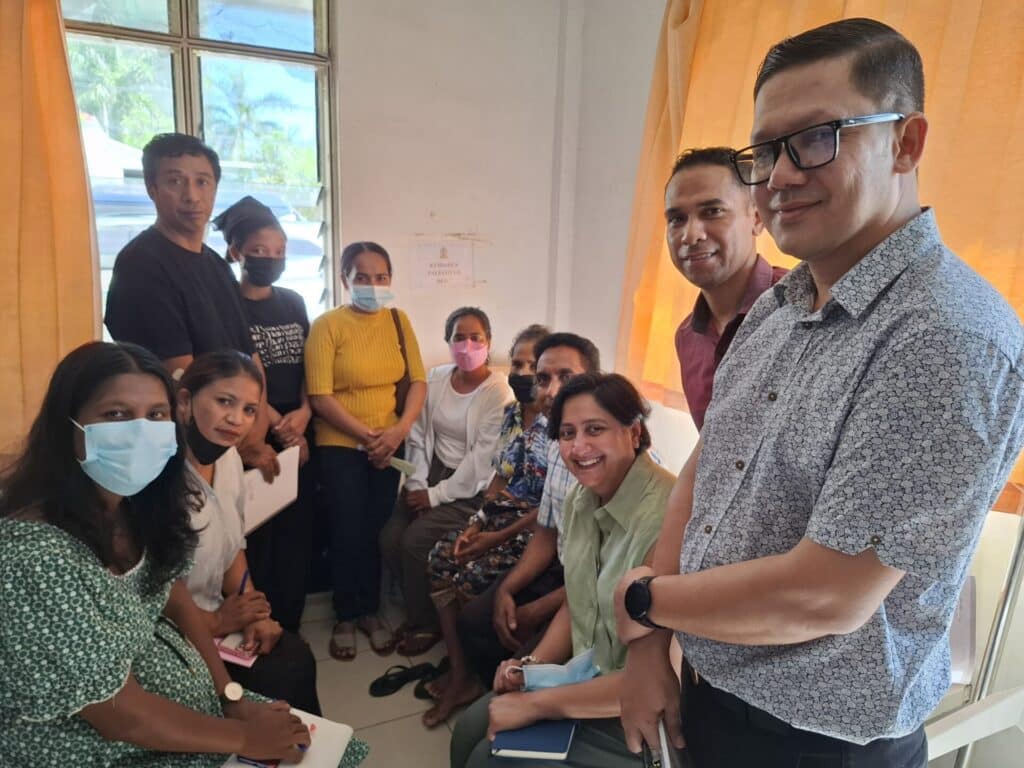
In the wards of Dili’s National Hospital, learning took on a different meaning this week—one rooted not in theory, but in compassion. As part of the APHN-Lien Collaborative Palliative Care Training, a group of doctors and nurses from across Timor-Leste came together for five days to strengthen not only their clinical knowledge, but also the deeper skills that define palliative care: empathy, communication, and presence.
The training, themed “Building Compassionate Competence,” focused on blending bedside learning with shared reflection. It encouraged participants to engage directly with patients, explore real cases, and learn through doing. Instead of long lectures, the week unfolded through dialogue, teamwork, and mutual teaching—a living example of how compassionate competence is built, one encounter at a time.
Participants led sessions on pain assessment, pain management, symptom control, mouth care, and wound care. These sessions were not only about mastering techniques, but about reclaiming confidence—the confidence to care, to comfort, and to communicate. Watching participants present, teach, and support one another revealed just how far Timor-Leste’s palliative care movement has come in recent years.
Communication was another cornerstone of the week. Through role plays and ISBAR-based case discussions, participants practiced how to break bad news, clarify opioid use, and manage emotionally complex situations with honesty and grace. These exercises often brought moments of silence, reflection, and even tears—reminders that in palliative care, our humanity is both the tool and the goal.
The learning environment was deeply collaborative. Nurses and doctors worked as equals, bridging professional divides to serve a shared mission. Each interaction reflected the essence of palliative care: compassion without hierarchy, teamwork without ego. This sense of unity extended beyond the classroom, inspiring participants to bring what they learned back to their hospitals, communities, and patients’ homes.
By the end of the week, the transformation was visible. Participants who began hesitantly were now speaking with assurance, guiding peers, and planning advocacy efforts in their own regions. The training rekindled a sense of hope that with empathy and skill, even limited resources can deliver comfort and dignity to those most in need.
This week was not just another training. It was a reaffirmation that palliative care in Timor-Leste, through the continued support of the APHN-Lien Collaborative, is growing from within—carried forward by local professionals who are both competent and compassionate. Each bedside conversation, each act of listening, each moment of shared humanity is helping to shape a more caring health system for all.
Written by by Dr. Nilton Saturnino E. da Costa S. Cruz
General Practitioner and Family Medicine Practitioner
Lead Author, Timor-Leste Palliative Care Guideline 2022 Liaison Officer for Stakeholders at Ekipa Kuidadu Paliativu Nasional
Former Palliative Care Client Coordinator Former Head of Department for Support and Coordination of Specialized Services, Ministry of Health
This project is a Lien Collaborative for Palliative Care initiative to build capacity in developing countries in Asia. The Lien Collaborative for Palliative Care was co-developed by the Asia Pacific Hospice Palliative Care Network (APHN) and the Lien Foundation.
